 |
| Shooting Stars (Primula clevelandii) take flight |
Showing posts with label winter blooming. Show all posts
Showing posts with label winter blooming. Show all posts
Saturday, March 12, 2016
Photo of the Day: Shooting Star
Wednesday, March 9, 2016
Hello, My Name is...Western Redbud
 |
| Western Redbud (Cercis occidentalis) at the Regional Parks Botanic Garden, March 2015 |
Hi! My name is Western Redbud, but the scientific folk call me Cercis occidentalis. I am much beloved in the native plant community because I look great year round, when properly maintained, and I'm the center of attention in early Spring when my abundant pink flowers start brightening the landscape.
 |
| Vivid clusters of flowers in early March |
I can get quite large -- 15' high and 10' wide -- and can be pruned (ouch!) to work as a small tree or a broad multi-trunked shrub. I do best in climates with hot summers and cold winters (inland), and prefer no supplemental water once established. Full or part sun will work just fine. I lose my heart-shaped leaves in the Fall, leaving my limbs bare until the blooms appear in early March.
 |
| Fall foliage on the Western Redbud |
My buddies in the yard are ceanothus, island bush poppy, and monkeyflowers to name a few (I'm pretty popular, you know). We put on quite a show when we're all blooming at the same time.
Friday, March 4, 2016
Native Plant Profile: Montara Manzanita
 |
| Montara Manzanita (Arctostaphylos montaraensis) |
This is one of my favorite manzanitas because (a) it's local and (b) the bright green clasping green leaves are striking to me. I wanted to grow this shrub in my garden but it's almost impossible to find at native nurseries. A few years back my sister picked me up a one gallon plant from Central Coast Wilds in Santa Cruz. It lived in a wine barrel for a couple years, happily, and then was transplanted into the front yard this past Fall. I'm curious to see how it fares away from the coast in loamy/clay soil.
Wednesday, March 2, 2016
Tuesday, March 1, 2016
A partly sunny bed of natives
 |
| Clumps of Douglas Iris hybrids encircle a currant shrub |
The backyard is divided into various collections of plants based on their sun exposure. Some receive full sun, some part sun, and some full shade. Some are on drip irrigation, some are not. Typically these "islands" of plants feature a centerpiece shrub, raised on a berm, surrounded by colorful perennials.
This particular plant grouping is shaded much of the day by a large avocado tree, but does receive sun at various times of the morning and afternoon. The specimen shrub of the "island" is a 3 year old 'Barrie Coate' pink-flowering currant that begins flowering in January and continues into early April. It is surrounded by several Douglas iris hybrids ranging in color from dark purple to white. These begin flowering in late February and continue to mid April. This space is also shared with two western sword ferns that lie on either side of a bird bath and California polypody plants that appear seasonally from Fall to late Spring. Finally, two 'Point Reyes' groundcover manzanitas are situated inbetween the bird bath and a step stone path. The foliage of the manzanitas is dark green, providing a nice contrast with bright green of the neighborning ferns. The manzanitas are covered with small white/pink flowers in late Winter. This bed of plants is outfitted with drip irrigation for those times of extended drought. I give them 5 minutes of water a couple times a week, just to keep them looking fresher.
 |
| Iris douglasiana 'Canyon Snow,' the first of the irises to bloom this year |
 |
| Western Sword fern, Poystichum munitum |
 |
| Pt. Reyes bearberry, Arctostaphylos uva-ursi 'Pt. Reyes' |
 |
| California Polypody, Polypodium californicum |
 |
| Ribes sanguineum glutinosum 'Barrie Coate' in February |
Wednesday, March 20, 2013
UC Botanical Garden visit
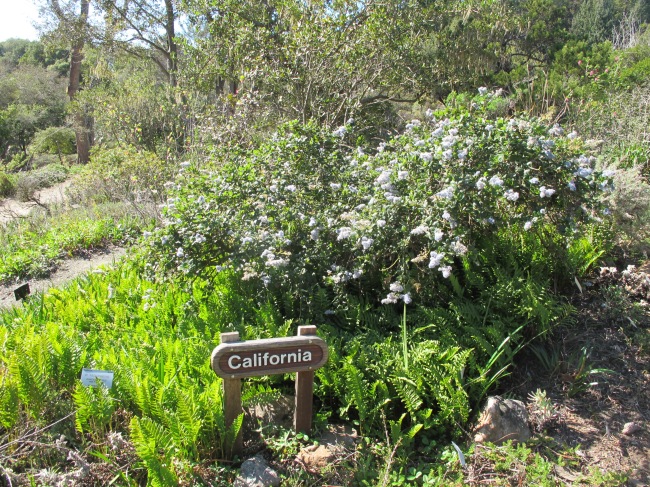 |
| Entrance to the California section of the UC Botanic Garden |
My wife and I recently visited the UC Botanical garden in the Berkeley hills above campus. Located in close proximity to the Regional Parks Botanical garden, the UC garden features one of the best California native plant displays in the Bay Area. The manzanita (Arctostaphylos) and California lilac (Ceanothus) collections are particularly impressive, as is the seven acre redwood grove located across the street from the garden entrance. Other personal highlights in the UC garden include fine coastal and Channel Islands sections and a large beautiful Oak Knoll. Our garden in San Mateo, which features many coastal plants and a dedicated Channels Islands section, was heavily influenced by the plant collections seen at the Regional Parks and UC gardens.
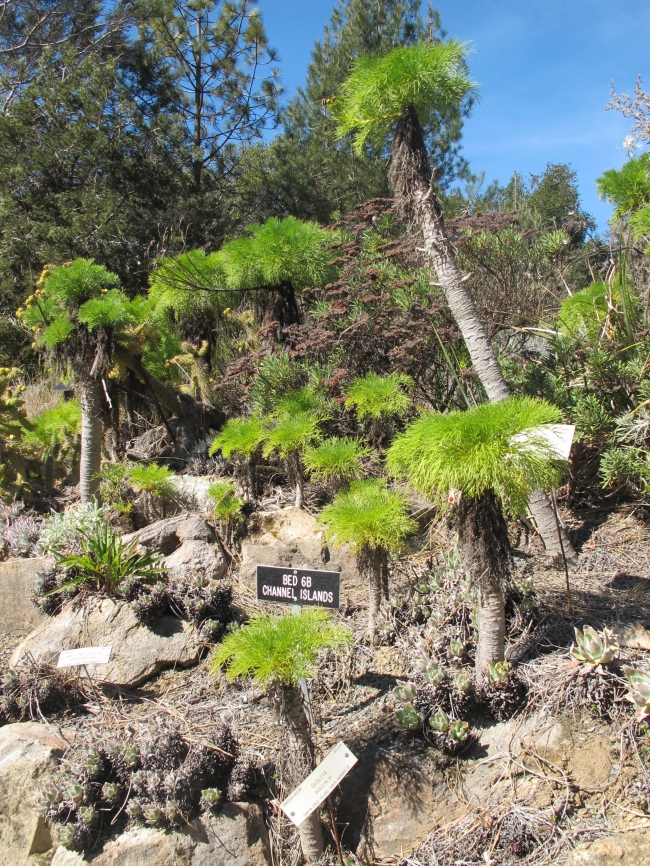 |
| New growth on the giant coreopsis (Coreopsis gigantea), one of the most distinctive Channel Islands' plants |
On this sunny February day, we were treated to fine displays of flowering manzanita, California lilac, currants and gooseberries (Ribes), and silk tassels (Garrya elliptica) among others. Here are a few of my favorite photographs:
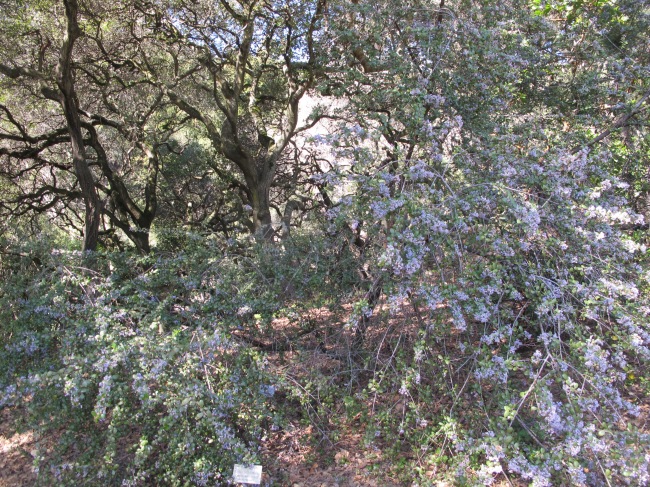 |
| A sprawling ceanothus underneath the oak knoll |
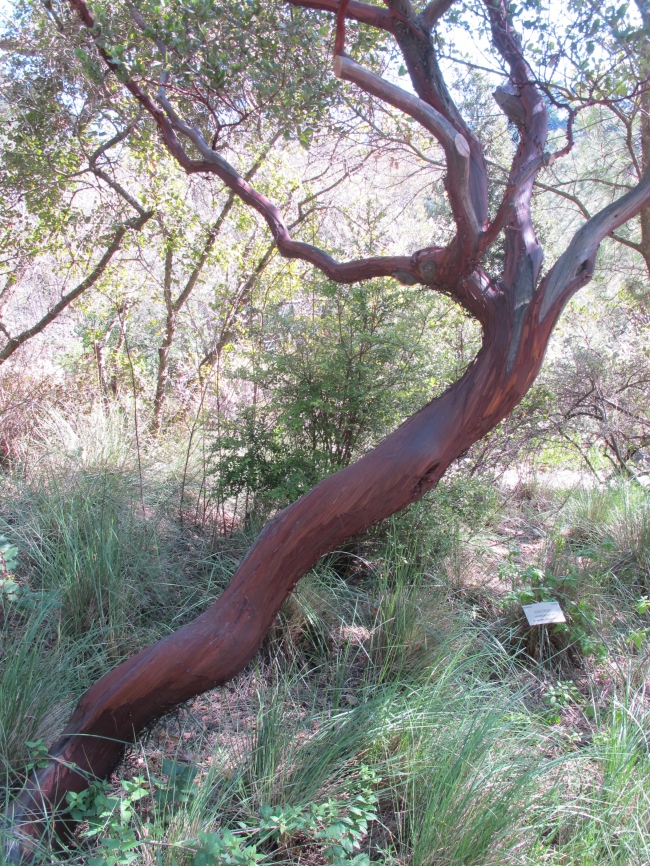 |
| A beautiful mature Central Coast manzanita in the chaparral section of the gardens |
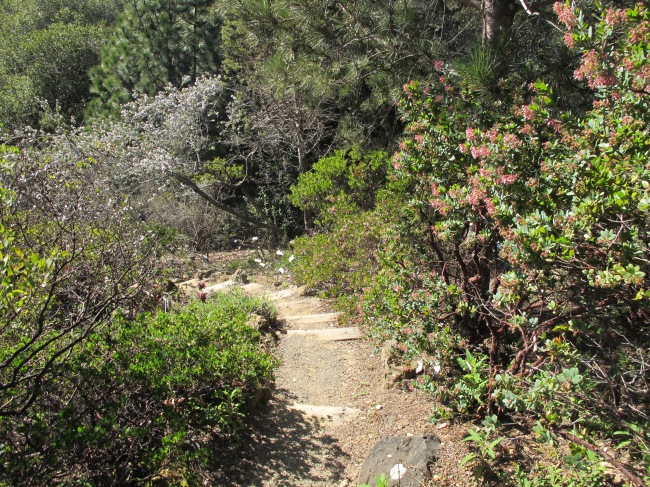 |
| A winding hillside path flanked by manzanita, ceanothus and hummingbird sage (Salvia spathacea) |
Unlike the Regional Parks garden, the UC botanical charges admission ($7) and parking fees (~$3) and contains collections from all over the world including South America, Asia and South Africa. There is a also an interesting herb garden/medicinal plant area and a fine (if small) plant shop with some nice, reasonably priced natives. I got my rare San Bruno mountain manzanita (A. imbricata) here. Despite the fees and hassle of navigating through the chaos of Berkeley to get there, I highly recommend a visit to the UC botanical garden.
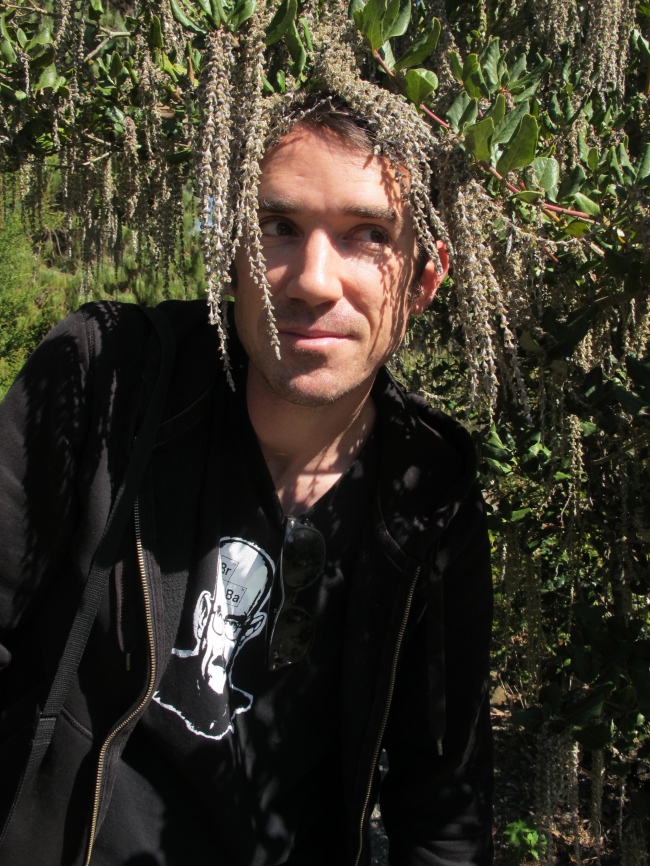 |
| Up close and personal with a flowering coastal silk tassel (Garrya elliptic) |
Monday, January 21, 2013
Tilden Regional Parks Botanic Garden in winter
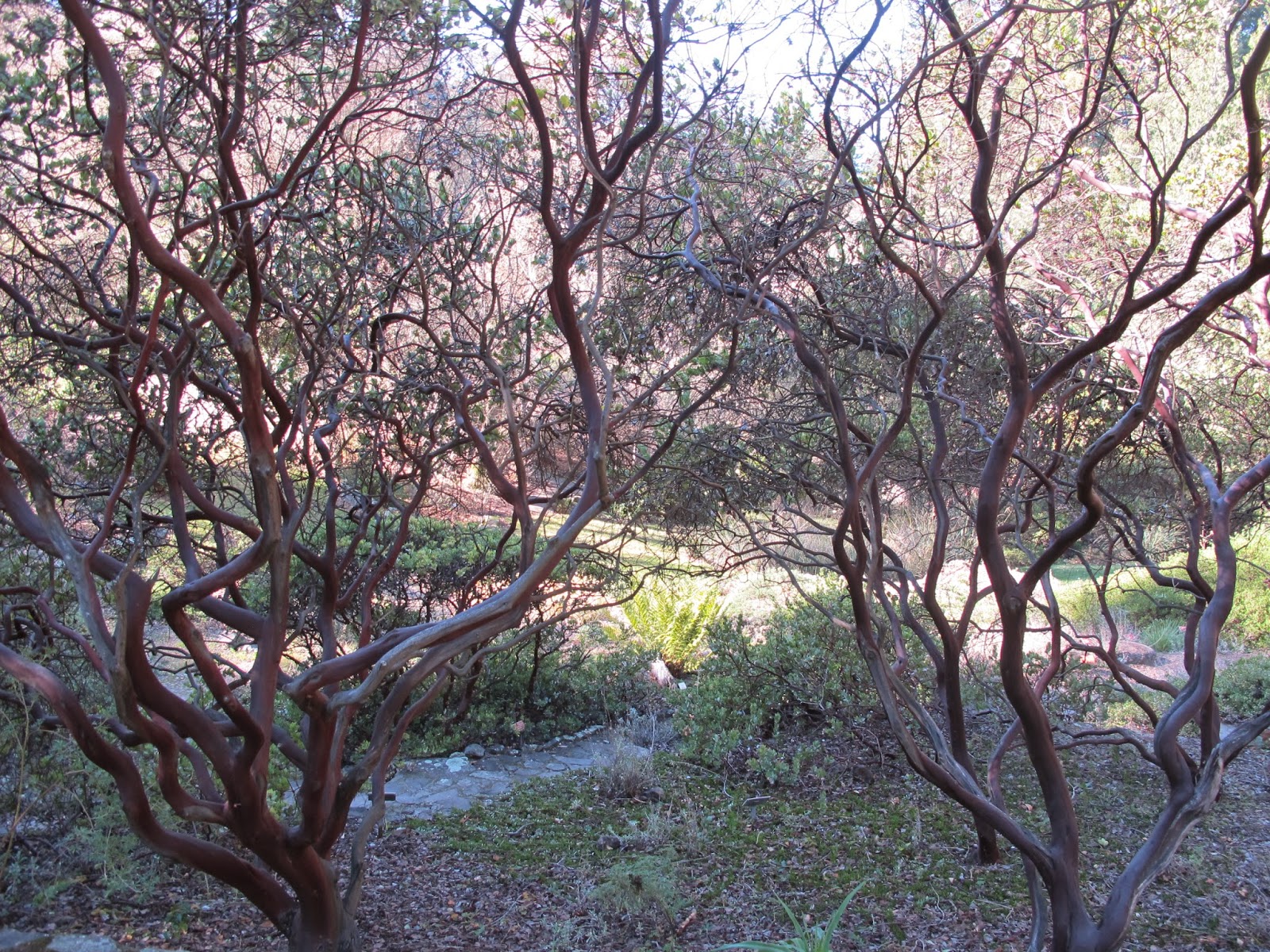 |
| Refugio manzanita (Arctostaphylos refugioensis) native to Santa Barbara area |
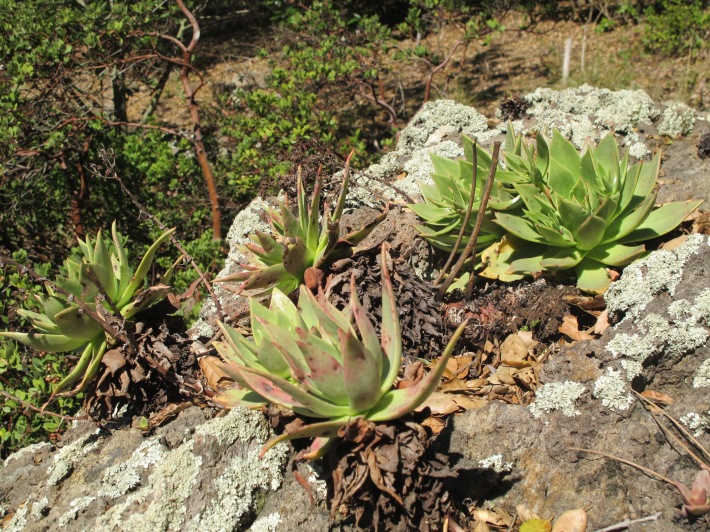 |
| Dudleya growing out of rock in the large Channel Islands section |
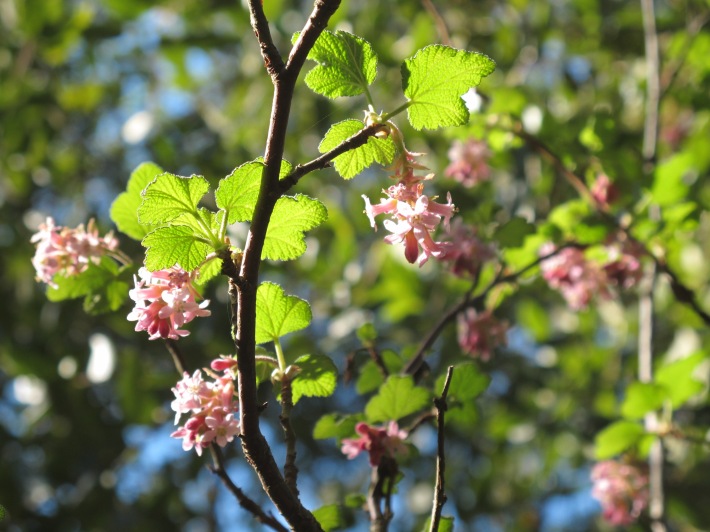 |
| Chaparral currant (Ribes malvaceum) |
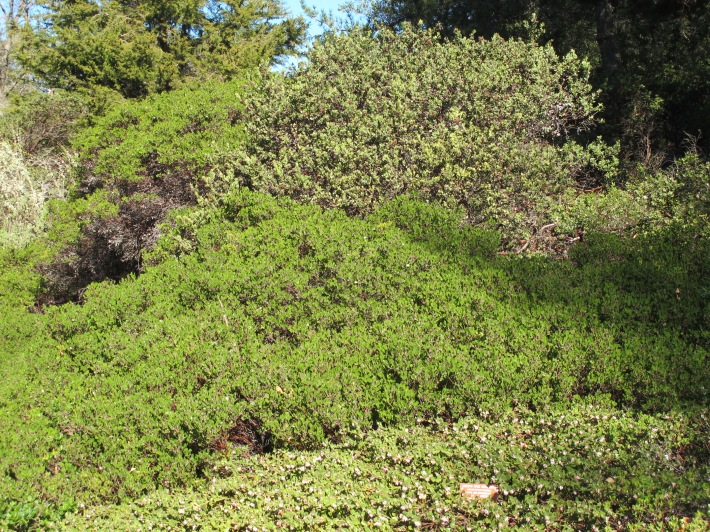 |
| Tapestry of manzanita |
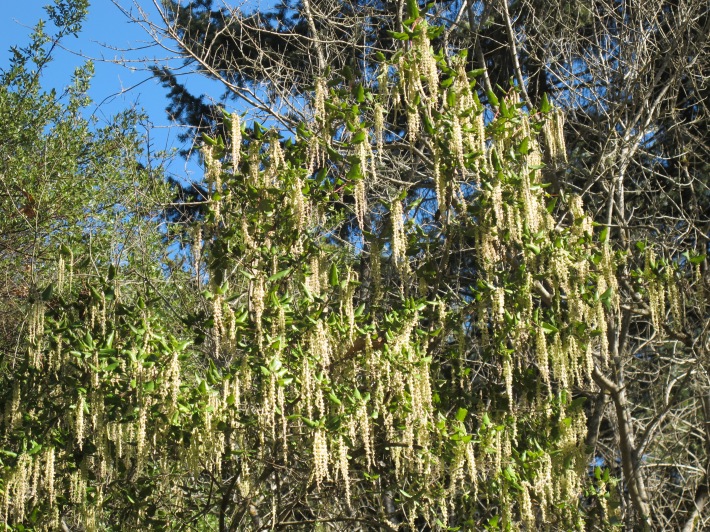 |
| Coast Silk Tassel (Garrya elliptica) |
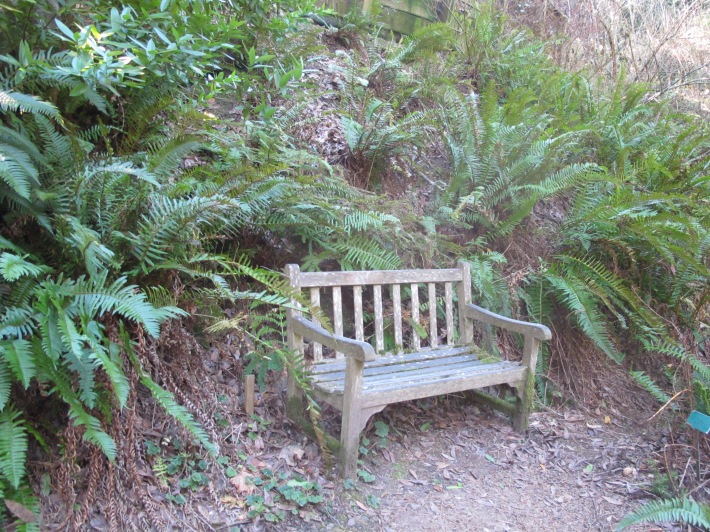 |
| One of the many beautiful old benches sprinkled around the grounds |
Subscribe to:
Posts (Atom)



